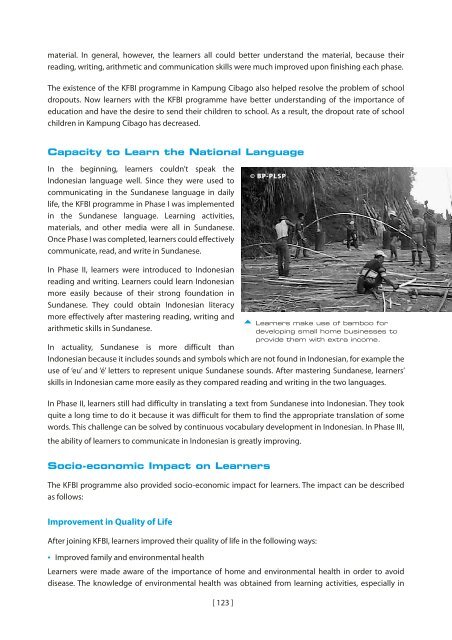Mother Tongue-based Literacy Programmes: Case Studies of Good ...
Mother Tongue-based Literacy Programmes: Case Studies of Good ...
Mother Tongue-based Literacy Programmes: Case Studies of Good ...
You also want an ePaper? Increase the reach of your titles
YUMPU automatically turns print PDFs into web optimized ePapers that Google loves.
material. In general, however, the learners all could better understand the material, because theirreading, writing, arithmetic and communication skills were much improved upon finishing each phase.The existence <strong>of</strong> the KFBI programme in Kampung Cibago also helped resolve the problem <strong>of</strong> schooldropouts. Now learners with the KFBI programme have better understanding <strong>of</strong> the importance <strong>of</strong>education and have the desire to send their children to school. As a result, the dropout rate <strong>of</strong> schoolchildren in Kampung Cibago has decreased.Capacity to Learn the National LanguageIn the beginning, learners couldn’t speak theIndonesian language well. Since they were used tocommunicating in the Sundanese language in dailylife, the KFBI programme in Phase I was implementedin the Sundanese language. Learning activities,materials, and other media were all in Sundanese.Once Phase I was completed, learners could effectivelycommunicate, read, and write in Sundanese.© BP-PLSPIn Phase II, learners were introduced to Indonesianreading and writing. Learners could learn Indonesianmore easily because <strong>of</strong> their strong foundation inSundanese. They could obtain Indonesian literacymore effectively after mastering reading, writing andarithmetic skills in Sundanese.In actuality, Sundanese is more difficult thanIndonesian because it includes sounds and symbols which are not found in Indonesian, for example theuse <strong>of</strong> ‘eu’ and ‘é’ letters to represent unique Sundanese sounds. After mastering Sundanese, learners’skills in Indonesian came more easily as they compared reading and writing in the two languages.In Phase II, learners still had difficulty in translating a text from Sundanese into Indonesian. They tookquite a long time to do it because it was difficult for them to find the appropriate translation <strong>of</strong> somewords. This challenge can be solved by continuous vocabulary development in Indonesian. In Phase III,the ability <strong>of</strong> learners to communicate in Indonesian is greatly improving.Learners make use <strong>of</strong> bamboo fordeveloping small home businesses toprovide them with extra income.Socio-economic Impact on LearnersThe KFBI programme also provided socio-economic impact for learners. The impact can be describedas follows:Improvement in Quality <strong>of</strong> LifeAfter joining KFBI, learners improved their quality <strong>of</strong> life in the following ways:• Improved family and environmental healthLearners were made aware <strong>of</strong> the importance <strong>of</strong> home and environmental health in order to avoiddisease. The knowledge <strong>of</strong> environmental health was obtained from learning activities, especially in[ 123 ]

















